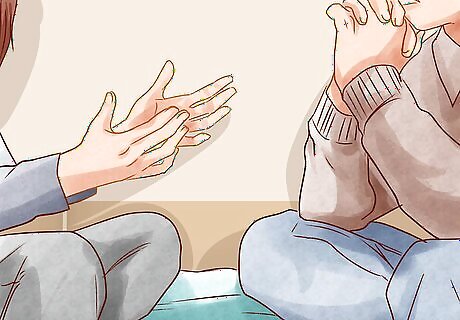
views
Resetting Your Mind
Stimulate your brain. Much of your everyday brain function is unconscious, so you typically do not utilize your brain’s full capacity. By becoming more conscious of your actions and thoughts, you can maximize your brain’s function. To help do this, you can: Go out of your way to learn new things each day. Look up the definitions of new words, complete a new DIY project, or try cooking a new dish. Practice mental exercises, such as writing with your non-dominant hand, that challenge and rewire your brain. Incorporate brain-boosting foods into your diet such as: wheat germ, black currents, acorn squash, amalaki, and sage, most of which contain antioxidants and/or high amounts of Vitamin B and Vitamin C.
Practice daily meditation. Incorporating daily practices of meditation will help your entire mind and body relax, decreasing any stress built up, and improving your overall body functioning and health. Every time you have a chance to quiet down your environment, close your eyes, and bring your mind inward without external distractions, your brain gets a chance to rest and reset itself. Try practicing the following meditative steps for at least 15 to 20 minutes each day: Go to a quiet space in your home without any distractions. Dim the lights and use soothing scented candles to help set the relaxing mood. Find a comfortable place to sit, close your eyes, take a few deep breaths, and focus on your breathing as you inhale and exhale slowly. Allow any internal dialogue or thoughts to come and go. Try not to linger on any thought, but don’t try to force it away. Acknowledge it, and just let it go. Recite a positive and empowering mantra 3-5 times to help improve your perception.

Go outside. Nature offers a wonderful outlet to beat stress that may arise from a mental block. Plus, a bit of time outdoors can improve cognitive functioning. Take five and walk around your neighborhood or a nearby park. Or, lace up your trainers and go for a longer hike. You just might have figured out a solution to your problem when you return.

Do an aerobic exercise. If you’re experiencing a mental block, you may have been sitting at a desk or computer for a while. Get up and move your body. Complete 50 jumping jacks. Hit up the local pool for a swim. Or, go for a short run. Research reveals that aerobic exercises like those mentioned above improve resourcefulness and task performance.

Take a nap. Mental blocks can tire you out both mentally and physically. Rejuvenate with a quick nap, and you might experience a major boost in cognitive performance. What’s more, you can experience positive effects from both long (e.g. two hour) and short (e.g. 45 minute) naps.

Laugh. Whether you’re bowling over at a wisecrack comedian or watching cute animal or baby videos, laughter simply feels good. Adding some humor to your day will provide a temporary and stress-relieving distraction from your mental block. Watch a short video or call up your funny friend to reset your mind.

Unload with journaling. Writing about your thoughts and feeling may not sound like a way to improve your mental block. But studies show that cognitive and emotional processing can help you view stressors in a more positive light. Grab a pen and pad and write earnestly about what you’re thinking and feeling. The process just might help you arrive at a solution, too.
Changing Your Methods

Explain what you’re doing to someone else. Sometimes, when you hit a wall, the best way to address it is by going in a different direction. Experts suggest learning something new to overcome mental blocks, so take advantage of this advice and force your brain to look at the problem in a novel way. Try to walk a friend through what you’re doing. Encourage them to ask questions. Having to step back and view your problem from a different perspective may help you derive at a creative solution.

Divide the project into smaller parts. You can experience a mental block due to feeling overwhelmed by the size and scope of a project. If this is happening to you, stop looking at the project as a whole and focus on one part at a time. Doing this relieves stress and boosts productivity. For example, if you are tasked with building a website, you might start by getting a sheet of paper and drawing up a rough draft of what you want it to look like. Then, go in and build the basic structure, add security and software, and then add content and finishing details.

Start at the end. It may seem counterintuitive, but one way to get some perspective on your problem is by reconnecting with the desired outcome. You may have hit a wall because you are getting caught up on details. If this is the case, it can help to visualize your end goal and disregard the details for the time being. Close your eyes and take a few deep breaths. Now, use your senses to envision yourself accomplishing your desired goal. For instance, if your goal is to write a book, see yourself sending a final manuscript to a publisher. Imagine all the energy that you feel around you and inside you—the sounds, sensations, and sights. Once that image is firm in your mind, envision the process of getting there. See yourself completing every single action from outlining and researching to revising and designing a cover jacket.

Get feedback. Another method for changing the way you’re looking at your problem is by seeking out advice. This may seem like an obvious solution, but many people overlook the resources at their fingertips. Activate your social network and reach out to a few friends or colleagues who may be able to help. You might say, “I’m working on a project and seem to have a hit a wall. Can you offer any advice?”
Bringing Energy to Your Environment

Listen to inspirational music. In addition to helping you express emotion, music also promotes creativity and serves as a source of inspiration. If your fingers pounding away at the keyboard or tapping your pencil against the desk are the only sounds you hear, fill the void with inspirational music. Choose whatever genre you think will motivate you. This might be rock and roll, or pop.

Work in a new place. If your work environment is uninspiring, you may be overdue for a change in location. Switching up your work environment may be just what you need to get those creative juices flowing and burst through your mental block. Try working in a library, co-work center, or coffee shop. You might even take your work materials to a park or riverfront and work outside.

Tidy your environment. You may have run into a mental block because the energy in your workspace is confining or even distracting. There is a correlation between an uncluttered work environment and enhanced creativity. So, if your work space is cluttered, try doing a quick de-cluttering.

Create or review your vision board. There’s a reason the vision board trend has taken off with everyone from creative professionals to travelers. Seeing your goals everyday can have a miraculous impact on your actions towards reaching them. In your case, creating or reviewing your board may offer inspiration to help you overcome a mental block. If you don’t already have a board, create one using inspiring quotes, song lyrics, photos, colors, fabrics, or anything else that relates to your project.




















Comments
0 comment